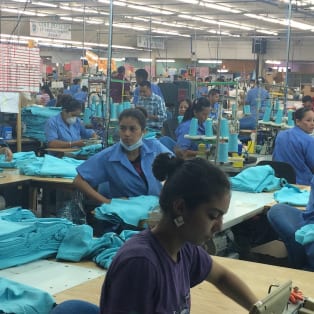Maquila workers in El Salvador and Honduras are challenging employer attempts to use the coronavirus as a way to cut wages, layoff workers and even stop worker efforts to form unions.
In Honduras, after the government on March 15 barred groups larger than 50 from gathering to stem the spread of COVID-19, most maquila employers told workers to go home when they showed up the next day for work.
But at some apparel factories, workers were expected to continue as usual, including at a Gildan plant where 2,400 workers make T-shirts and sweatshirts for export.

After the employer refused to let them leave, the workers demanded they be sent home and marched to the factory gates, alerting the media that the employer was not following the government’s order. The employer released them by 11 a.m., says Eva Argueta, coordinator of organizing maquila workers for the General Workers Central (CGT) union confederation. The plant is among three of the six Gildan factories where workers are represented by a union and have a collective bargaining agreement. At Fruit of the Loom factories, where workers also protested the employer’s demand they continue working, they were released at 3 p.m. the same day, she says.
“Workers need to demonstrate their collective power at the workplace—and that’s what we saw here,” says Argueta. “That’s what we need to see everywhere, because people can’t be exposed. It’s a matter of health and lives.”
Argueta led the campaign over the past several years to organize unions represented by CGT and the Independent Federation of Workers of Honduras (FITH) in 30 factories that represent 60 percent of workers in Honduras’s apparel and light manufacturing sectors. Collective bargaining agreements included significant pay increases, free transportation to and from work, free lunch, and educational funds for workers and their children.
Immediately after the government’s announcement to limit gatherings, she negotiated with the Maquila Chamber of Commerce to ensure workers would be paid during plant closures. While she says employers wanted workers to use their vacation for the week the plant closed, they ultimately agreed to pay them. Argueta says negotiations are still ongoing to ensure employers pay not just the minimum wage, but worker’s average pay.
“Workers are not responsible for their employers’ business losses, and it shouldn’t be taken out of their wages and benefits,” she says.
Shutting Plants to Stop Workers from Forming Unions
The government of El Salvador closed all public and private enterprises March 16, and labor inspectors were at plants the next day to ensure they shut their doors. But many managers are asking workers to sign “severance agreements,” which provide an immediate payment but ensures they will not be rehired. Union activists say some of those plants are among those where workers are trying to form unions, and the employers hope to use the COVID-19 pandemic as a way to close factories rather than negotiate with workers.
Although the government has required employers to pay textile workers for the time closed, FEASIES, a federation representing maquila and domestic workers, is gearing up for action at the end of the month, when union leaders anticipate many workers will not be rehired or paid.
Even though there are no collective bargaining agreements in El Salvador’s apparel sector, FEASIES and its unions are poised to strongly advocate for maquila workers in coalition with women’s and community groups that support organizing among garment workers and advocacy for their rights. FEASIES also has established a first-ever dialogue with the labor ministry.
The federation also is communicating with garment workers through social media, alerting them to their rights in case they are laid off or asked to sign severance agreements.
In Guatemala, where the government has issued mandatory safety precautions at workplaces, including requiring employers to provide transportation for workers because public transportation has been halted, maquila employers are demanding garment workers stay on the job. Garment workers have struggled for decades to form unions, which for many years were repressed with violence. Today, workers seeking to form at maquilas face strong opposition from employers, and do not have collective bargaining rights.

